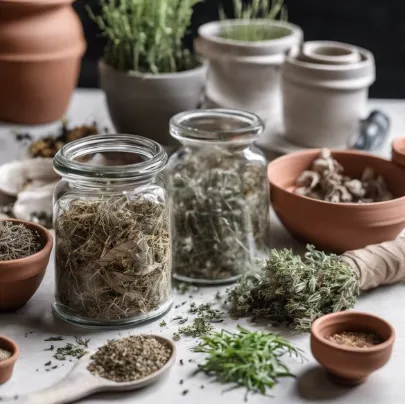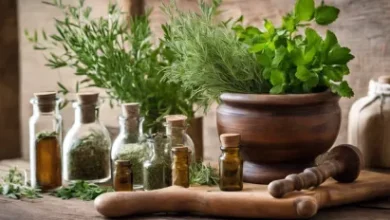Nature’s Medicine Cabinet: Unlocking the Secrets of Powerful Anti-Inflammatory Herbs

In today’s fast-paced world, its easy to overlook the subtle signs of inflammation that can accumulate in our bodies. From chronic pain to digestive issues, inflammation can manifest in various forms, often hindering our overall well-being. While conventional medicine offers solutions, many people are turning to natural alternatives to manage inflammation. Enter the world of natural anti-inflammatory herbs, a treasure trove of botanical remedies that have been used for centuries to soothe and heal.Nature’s Medicine Cabinet
The Inflammation Connection: How It Affects Your HealthNature’s Medicine Cabinet
Inflammation is is a natural response of the body’s immune system to injury or infection. It’s a complex process involving various cells and molecules that work together to protect the body. However, chronic inflammation, which persists over a long period, can lead to a host of health problems.
Chronic inflammation has been linked to a wide range of diseases, including:Nature’s Medicine Cabinet
- Heart disease: Inflammation can damage blood vessels and contribute to the buildup of plaque, increasing the risk of heart attacks and strokes.
- Diabetes: Chronic inflammation can impair insulin sensitivity, leading to type 2 diabetes.
- Arthritis: Inflammation is a key factor in conditions like rheumatoid arthritis and osteoarthritis, causing joint pain and stiffness.
- Neurodegenerative diseases: Chronic inflammation has been implicated in neurodegenerative disorders such as Alzheimer’s nad Parkinson’s disease.
- Autoimmune diseases: Conditions like lupus and Crohn’s disease are characterized by an overactive immune system and chronic inflammation.
A Holistic Approach: Combining Diet and Natural Anti-Inflammatory Herbs
While natural anti-inflammatory herbs can be incredibly beneficial, a holistic approach too managing inflammation is essential. This involves combining a healthy diet with the power of these natural remedies.
Dietary Strategies to Reduce Inflammation
- Anti-inflammatory diet: A diet rich in fruits, vegetables, whole grains, lean proteins, and healthy fats can help reduce inflammation.
- Limit processed foods: Processed foods often contain unhealthy fats, added sugars, and excessive sodium, which can contribute to inflammation.
- Reduce sugar intake: High sugar intake can trigger inflammation in teh body.
- Healthy fats: Omega-3 fatty acids, found in fatty fish like salmon and flaxseed, have potent anti-inflammatory properties.
Top 5 Natural Anti-Inflammatory Herbs for Optimal Health
- Turmeric: This golden spice contains curcumin, a powerful compound with potent anti-inflammatory and antioxidant properties. Curcumin can help reduce inflammation, improve joint health, and boost brain function.
- Ginger: Ginger is another popular herb with anti-inflammatory properties. It can help soothe digestive issues, reduce muscle pain, and alleviate nausea.
- Garlic: Garlic is a natural antibiotic and anti-inflammatory agent. It can help lower blood pressure, reduce cholesterol levels, and boost the the immune system.
- Cayenne Pepper: Capsaicin, the compound that gives cayenne pepper it’s heat, can help reduce pain and inflammation. It can also improve circulation and aid digestion.
- Rosemary: This aromatic herb is rich in antioxidants and anti-inflammatory compounds. It can help improve memory, reduce oxidative stress, and protect brain health.
Creating Your Own Anti-Inflammatory Elixir: Recipes and Tips
You can incorporate these natural anti-inflammatory herbs into your daily routine in various ways. Here are a few tips:natural anti-inflammatory herbs
- Golden Milk: This soothing drink combines turmeric, ginger, and other spices with milk or plant-based milk.
- Herbal teas: Brew herbal teas with anti-inflammatory herbs like chamomile, peppermint, and ginger.
- Cooking with herbs: Add herbs like rosemary, thyme, and oregano to your meals to enhance flavor and boost your intake of antioxidants.
- Supplements: Consider taking supplements containing turmeric, ginger, or other anti-inflammatory herbs, especially if you have specific health concerns.
Consult Your Healthcare Provider: When to Seek Professional Advicenatural anti-inflammatory herbs
While natural anti-inflammatory herbs can be beneficial, its important to consult with your healthcare provider before making significant changes to your diet or supplement regimen. 1 They can help you determine the best approach for your individual needs and address any underlying health conditions.
By By understanding the connection between inflammation and various health conditions, and by incorporating natural anti-inflammatory herbs into your lifestyle, you can take control of your health and well-being. Remember, a holistic approach that combines diet, lifestyle, and natural remedies is key to managing inflammation and living a vibrant life.



